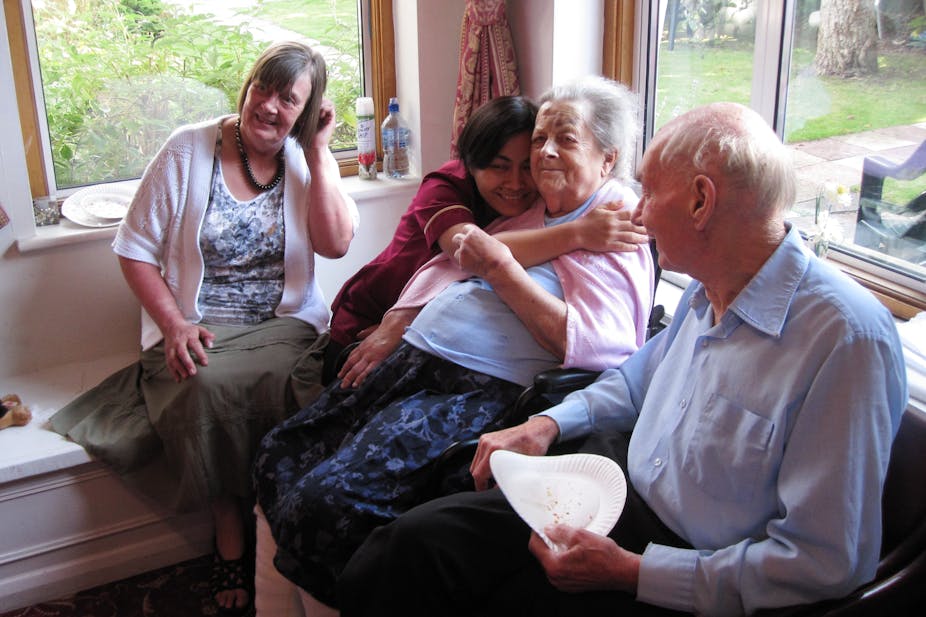Care homes for older people are once again under scrutiny following a damning investigation on BBC Panorama’s Behind Closed Doors: Care Exposed. But if you really want to understand some of the complexities of care, watch the more sensitive BBC2 documentary, Protecting Our Parents: Nowhere to Go that follows Birmingham’s care teams looking after older people over the course of a year.
Panorama used secret filming, which revealed residents being taunted, roughly handled and one being slapped. This stoked public outrage, fear and blame of staff. It has led to a moral panic, with Norman Lamb, Minister of State at the Department of Health, announcing there “could be a role” in the future for CCTV in care homes.
The second BBC programme, on the other hand, showed the complexity of dealing with frailty (including dementia) from the perspective of the professionals, families and older people. Less sensational, Protecting Our Parents has received much less media attention.
No quick fixes
The answer to preventing abuse in any care setting is not an Orwellian vision of society with cameras and computers spying on every person’s movements. Technology is a quick fix, and will not address what happened at the Old Deanery care home in Essex. Society needs to wake up to the changing demographic of increasing numbers of frail older people, in particular those with dementia, and a more sophisticated debate needs to be had about how to manage this frailty and pay for care.
Sadly most people only take an interest in this topic when their own lives are touched by it. We all need to realise that we are talking about “us” and not about “them”. We also have a wider social responsibility to engage with how the vulnerable in our society should be cared for.
Abuse in any setting is wrong and immediate action needs to be taken to remove those who do harm to prevent malpractice in the future. But for me, what was missing from Panorama was the voice of staff. We heard outrage, but there was no real attempt to learn from those who do the job.
One journalist’s reflections based on 36 undercover shifts in one home is not enough. There are 18,000 care homes for older people in the UK providing care for approximately 400,000 residents (over three times the number of beds in the NHS). It is too easy to scapegoat individuals, particularly in a sector much maligned by the press.
Support not abuse
Negative press does very little to improve quality of care in care homes. We should consider the effect of abuse that is projected onto staff who are constantly working in difficult circumstances, poorly paid and supported. We need to ensure that they are able to meet the changing needs of residents. This begins by understanding the context better (not apportioning blame), valuing and respecting each other more (public and private) and focusing on making a difference, through evidence-based and relationship-centred care.
National policies that focus on care at home have led to older people going into care homes later and more sick. Care home residents often have complicated health and social care needs, resulting from multiple long-term conditions, with significant levels of disability and frailty (for instance, 80% of residents have some form of dementia). But these residents are being cared for by a predominantly social care (rather than health care) workforce that is poorly paid, with low level or no educational qualifications.
Many staff are doing a good job in conditions that aren’t easy. Local authorities do not pay a fair rate for care and rely on competitive markets for providers to cut costs. This does not drive up standards; investment and support does.
Caring for older people can be both rewarding and enormously challenging. If we want great care, we must not only look after the needs of older people who live and die in care homes, but also the rarely considered needs of relatives and often ignored needs of staff who are working in complex health and social care systems, not always fit for purpose.
At City University, the My Home Life project works with the sector to make quality improvements in a positive and appreciative way. We can all play a part, by engaging with care homes in our local communities and by feeding back our good ideas about the future direction of this sector. This can be done by getting in touch with the Commission on Residential Care and the Commission on Hospital Care for Frail Older People for improving care across the board.
The relationships between residents, relatives and staff, as well as between care homes and the local community and wider health and social care system matter. If we do not nurture these in a healthy way, abuse will inevitably continue.

